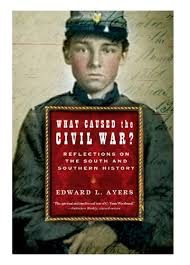DeepContingency

"We should … somehow wean ourselves off the need to expect simple resolving answers …"
Edward Ayers, in his brilliant essay What Caused The Civil War, recounts how The Simpsons character Apu passes his citizenship test. In response to the final exam question, What Caused The Civil War, Apu starts to go into a lengthy explanation of the political, social, and economic forces contributing to the tragedy, but his proctor interrupts him by whispering sotto voce, "Just say Slavery." We do tend to go looking for simple answers to complicated questions and even extending the more satisfying ones into culturally imperative memes. If you don't know the appropriated answer, your response implies that you don't know or, in more extreme cases, that you might be deluded. We all, after all, know that slavery caused that war, though it wasn't until the third year of the conflict that Lincoln reluctantly admitted that slavery had "eventually" caused it. ©2018 by David A. Schmaltz - all rights reserved
Apu's first answer was more right but also much less satisfying. Most everything cultural suffers from what Ayers calls Deep Contingency. Each issue exists in a context wherein each step somehow changes the context. These stories don't read like we have learned proper stories are supposed to read. No clear good guys or bad, twisted causes as well as effects, no clearly inferred moral at the end. We might consider the competing tensions without constructing a resolving lesson, perhaps only discovering more questions. Many twisty passages which imply that we don't definitively know, but only because we couldn't possibly definitively know.
Today, despite generations of understanding that we compute for insights rather than answers, we persist in computing for answers, or trying to. We ask Alexa and expect a crisp response. We shun research in favor of the almighty search powered by a metaphorical engine, which we choose not to investigate exactly how it manages to distill overwhelming ambiguity into simple answers and memes. Then we run with the answers and memes, sharing them via a social media especially designed to transport these satisfying yet misleading representations. Consequently, we know for certain what nobody could possibly know. How advanced does that make our emerging society?
Curiously, one of the forces that caused The Civil War was an explosion of information technology, telegraphs and newspapers, which for the first time in history allowed information to move at a speed exceeding that of a walking horse. Consequently, people's horizons expanded, allowing the easy mind reading and jumping to conclusions that any long-distance relationship requires. People started living more in the future, reacting to supposed next moves before they could confirm that move had happened. We could confidently presume beforehand and act to counteract what we just knew would occur if we did not act. Much of the run-up to the war seemed to have been fueled by reactions which preceded the action being countered. Of course, few suspected this at the time.
Our time seems little different, as an information revolution similarly overwhelms us. We go out seeking simple answers, find satisfaction when finding them, then proceed to amplify their poisonous effect by sharing them as widely as we can. Cambridge Analytica turned this human frailty into a successful business model for perverting elections. Our every action emerges from within some DeepContingency as our context almost invisibly shifts with our every move. The story refuses to unfold properly. Those who insist upon telling their stories with DeepContingency fully recognized find themselves lambasted as lousy storytellers. Where are the clear heroes and revile-able villains? Where is the salvation and redemption chapter? It never comes.
We have no real need to fear the so-called Deep State, for it, too, seems to have been a construct proposed for narrow political purposes, just another plot twist in our deeply contingent storyline. Our context continually shifts for each of us and while we might not reasonably expect clear, precise answers to our most troubling questions, we might somehow learn to utterly reject any semblance of clear and precise answer as unworthy of deep questioning and most likely unworthy of us. We should, I firmly believe, keep asking the hard questions but somehow wean ourselves off the need to expect simple resolving answers as a result.


